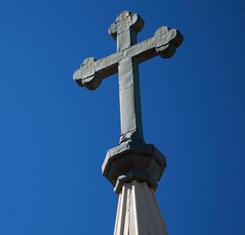The views expressed in our content reflect individual perspectives and do not represent the authoritative views of the Baha'i Faith.
This is Part 1 of the Jesus Christ in His Own Words series:
If the material world is infinite with regard to its manifestations of life, can the spiritual world be finite? The prophets of God have ever appeared in the ages of the past and will continue to appear throughout the ages of the future. – Abdu’l-Baha, Divine Philosophy, p. 170.
I was raised a nondenominational Christian—or a Christian of many denominations. Because of my mother’s insistence that when pastors strayed from the clear meaning and context of scripture No Good Could Come of It, we attended a variety of churches: Baptist, Methodist, Presbyterian, Episcopalian, Catholic, Lutheran.
In all of these churches the central idea about Christ maintained He was fundamentally different from any other of God’s spokespersons.
I encountered that same idea recently in a discussion with a devoted Christian in an online forum. In response to my speaking of Christ’s prophethood, she stated: “Christ didn’t claim to be a prophet.”
I did what Mom taught me to do—I returned to the verses in which Christ speaks of His relationship with God. This is what I found: in the book of John (5:45-47 NKJV), Jesus says:
Do not think that I shall accuse you to the Father; there is one who accuses you—Moses, in whom you trust. For if you believed Moses, you would believe Me; for he wrote about Me. But if you do not believe his writings, how will you believe My words?”
 Where does Moses speak about Christ? Here is the reference from Deuteronomy 18: 15-16:
Where does Moses speak about Christ? Here is the reference from Deuteronomy 18: 15-16:
The Lord your God will raise up for you a Prophet like me from your midst, from your brethren. Him you shall hear, according to all you desired of the Lord your God in Horeb in the day of the assembly…
In verse 18, Moses reiterates this prophecy. According to the Torah, then, Moses foretells a Prophet like Him who would further the Divine message. What conclusion shall we draw other than that, when Jesus claims that Moses wrote of Him, He is referring to the prophecy in Deuteronomy and that He is, therefore, a Prophet like Moses?
Peter, teaching with John in Jerusalem after the ascension of Christ, confirms that this prophecy pertains to Christ (Acts 3:19-26):
Repent therefore and be converted, that your sins may be blotted out, so that times of refreshing may come from the presence of the Lord, and that He may send Jesus Christ, who was preached to you before, whom heaven must receive until the times of restoration of all things, which God has spoken by the mouth of all His holy prophets since the world began. For Moses truly said to the fathers, ‘The Lord your God will raise up for you a Prophet like me from your brethren. Him you shall hear in all things, whatever He says to you. And it shall be that every soul who will not hear that Prophet shall be utterly destroyed from among the people.’ …To you first, God, having raised up His Servant Jesus, sent Him to bless you, in turning away every one of you from your iniquities.
After all my years in Christian congregations, I was surprised at this connection, for no pastor I heard had ever preached a sermon on it, and no Bible study had ever covered it. I stumbled upon it during my attempts to prove or disprove the message of Baha’u’llah and the Baha’i Faith from a Biblical standpoint.
The conclusion I came to was inescapable: Jesus Christ was, by three separate testimonies—Moses’, His own, and Peter’s—a Prophet like Moses and, like Moses, a Servant of God.
This begs the question: what does that mean? What sort of Prophet was Moses, and what was the nature of the servitude He shares with Jesus?
Stay with me and we’ll explore those questions in the following articles.
Read the next article in the series: Jesus Christ – Face to Face with God


















Comments
Sign in or create an account
Continue with Facebookor